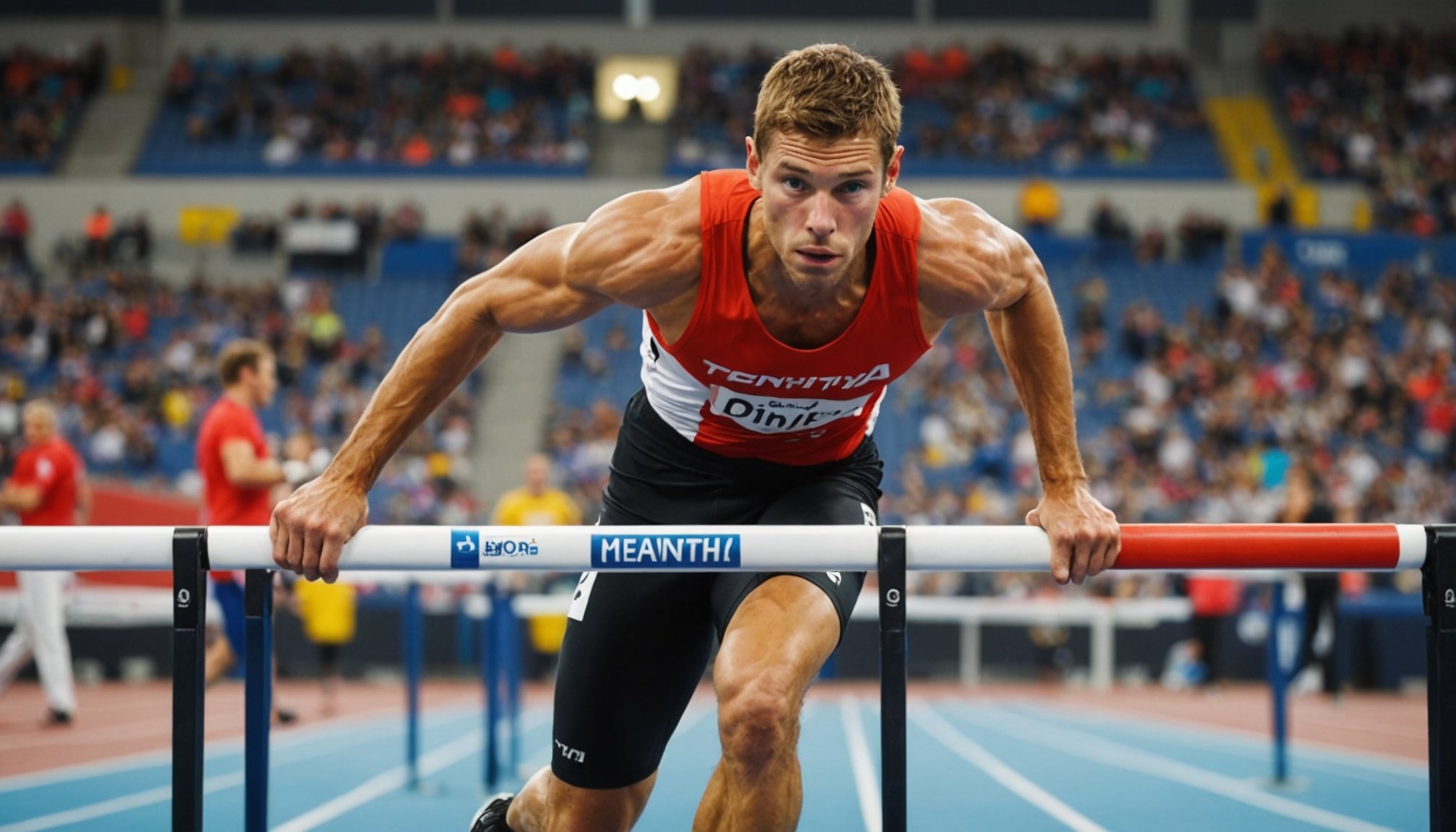Top Strategies for Optimal Recovery After Competing in a Pentathlon
Competing in a pentathlon, such as the modern pentathlon, is an incredibly demanding endeavor that pushes athletes to their physical and mental limits. The modern pentathlon, which includes fencing, swimming, obstacle racing, shooting, and cross-country running, requires a broad range of skills and an immense amount of training and preparation.
Understanding the Physical and Mental Demands
Before diving into recovery strategies, it’s crucial to understand the physical and mental demands of competing in a pentathlon. Modern pentathletes undergo rigorous training that includes running 12 km, practicing shooting, swimming, horseback riding, and fencing, all within a single day. This intense regimen can lead to significant physical fatigue and mental stress.
In the same genre : Essential Guidelines for Selecting the Best Protective Gear for Competitive Skateboarding
Physical Demands
The physical demands of a pentathlon are multifaceted:
- Energy Intake and Metabolism: Elite athletes often have lower total energy, carbohydrate, protein, and fat intakes compared to previous recommendations, yet they still manage to perform optimally. This highlights the importance of tailored nutrition plans.
- Muscular Endurance and Hypertrophy: Pentathletes need to balance muscular endurance with hypertrophy, as they require strength for events like fencing and endurance for events like cross-country running.
- Cardiovascular Performance: Maximum oxygen consumption (VO2 max), exercise economy, and lactate threshold are critical factors for endurance performance in events such as cross-country running and swimming.
Mental Demands
The mental aspect of competing in a pentathlon is equally challenging:
In parallel : Top Methods for Creating High-Altitude Training Environments for Mountain Bikers
- Stress and Mental Fatigue: The pressure to perform well across five diverse events can lead to significant mental stress and fatigue. Athletes must develop coping strategies to manage this stress effectively.
- Psychological Preparation: Mental recovery is as important as physical recovery. Athletes need to prepare psychologically to handle the stress and pressure of competition.
Immediate Post-Competition Recovery Strategies
Physical Recovery
Immediate post-competition recovery is crucial for reducing fatigue and preventing injury.
Nutrition and Hydration
- Amino Acid Supplementation: Amino acid supplementation, particularly glutamine, alanine, and other essential amino acids, can aid in muscle recovery and reduce muscle damage.
- Carbohydrate and Protein Intake: Consuming a balanced mix of carbohydrates and proteins within 30-60 minutes after the competition helps in replenishing energy stores and promoting muscle repair.
- Hydration: Adequate hydration is essential to replace lost fluids and electrolytes.
Rest and Sleep
- Rest Periods: Ensuring adequate rest periods is vital. Athletes should aim for 7-9 hours of sleep to help the body recover from the physical and mental exertion.
- Active Recovery: Light activities such as walking or gentle stretching can help in promoting blood flow and reducing muscle soreness.
Physical Therapy
- Massage and Foam Rolling: These techniques can help in reducing muscle tension and improving circulation.
- Ice Baths and Compression Garments: These can aid in reducing inflammation and muscle soreness.
Mental Recovery
Mental recovery is often overlooked but is equally important.
Psychological Support
- Counseling and Mental Health Support: Access to mental health professionals can help athletes cope with the psychological stress of competition.
- Relaxation Techniques: Practices such as meditation, deep breathing, and visualization can help in reducing mental fatigue and promoting mental recovery.
Social Support
- Family and Friends: Support from family and friends can provide emotional comfort and help athletes feel less isolated.
- Team Dynamics: Being part of a supportive team can also play a significant role in mental recovery.
Long-Term Recovery Strategies
Periodized Training
Periodized training involves structuring the training year into specific phases to avoid overtraining and allow for adequate recovery time.
Macro, Meso, and Micro Cycles
- Macro Cycle: The entire training year, which includes preparation, competition, and recovery phases.
- Meso Cycle: Smaller blocks within the macro cycle, typically lasting several weeks, focused on specific aspects of training.
- Micro Cycle: Weekly training plans that include rest days and active recovery sessions.
Nutrition Planning
A well-planned nutrition strategy is essential for long-term recovery.
Personalized Nutrition Plans
- Energy Intake: Tailoring energy intake to match the specific demands of each training phase.
- Macronutrient Balance: Ensuring a balanced intake of carbohydrates, proteins, and fats to support muscle repair and energy replenishment.
Supplementation
- Amino Acids: Regular supplementation with essential amino acids can aid in ongoing muscle recovery and repair.
- Other Supplements: Vitamins, minerals, and antioxidants can help in reducing oxidative stress and promoting overall health.
Practical Insights and Actionable Advice
Sample Recovery Plan
Here is a sample recovery plan for the first 48 hours post-competition:
Immediate Post-Competition (0-30 minutes)
- Consume a mix of carbohydrates and proteins
- Hydrate with water and electrolyte-rich drinks
- Light stretching and foam rolling
Short-Term Recovery (30 minutes – 24 hours)
- Rest and avoid strenuous activities
- Active recovery such as light walking or swimming
- Massage or physical therapy sessions
- Adequate sleep (7-9 hours)
Long-Term Recovery (24-48 hours)
- Continue with balanced nutrition and hydration
- Incorporate relaxation techniques such as meditation or deep breathing
- Gradually return to light training activities
Table: Comparative Recovery Strategies
| Recovery Strategy | Immediate Post-Competition | Short-Term Recovery | Long-Term Recovery |
|---|---|---|---|
| Nutrition | Carbohydrate and protein intake | Balanced meal plans | Personalized nutrition plans |
| Hydration | Electrolyte-rich drinks | Adequate water intake | Ongoing hydration |
| Rest | Avoid strenuous activities | Rest and active recovery | Periodized training |
| Physical Therapy | Light stretching and foam rolling | Massage and ice baths | Regular physical therapy sessions |
| Mental Recovery | Relaxation techniques | Psychological support | Ongoing mental health support |
Quotes and Insights from Experts
- “The recovery process is just as important as the training process. Athletes need to understand that recovery is not just about rest; it’s about active recovery and mental preparation,” says Dr. Adriana Bassini, a researcher in sports science.
- “Periodized training is key to avoiding overtraining and ensuring that athletes are at their peak performance during competitions,” notes a study published in the Journal of Strength and Conditioning Research.
Recovering from a pentathlon is a complex process that requires careful planning and execution. By understanding the physical and mental demands of the sport, implementing immediate and long-term recovery strategies, and seeking practical insights from experts, athletes can optimize their recovery and maintain peak performance.
Final Tips for Athletes
- Listen to Your Body: Pay attention to signs of fatigue and injury, and adjust your recovery plan accordingly.
- Seek Professional Help: Consult with nutritionists, physical therapists, and mental health professionals to tailor your recovery plan.
- Stay Consistent: Consistency in training and recovery is key to long-term success.
By following these strategies, athletes can ensure they are well-prepared for the next competition, both physically and mentally.











